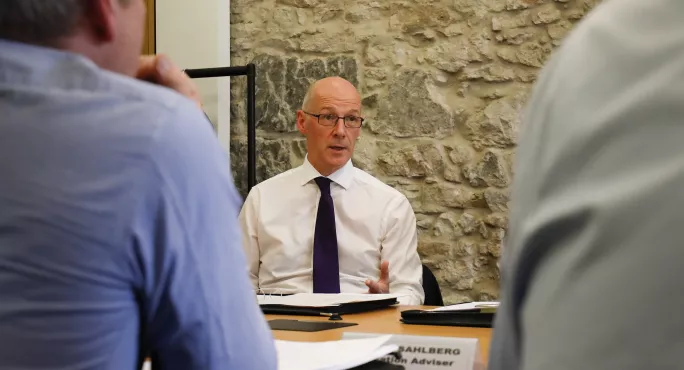- Home
- ‘Our pupils are the triumph of Scottish education’
‘Our pupils are the triumph of Scottish education’

In any walk of life it is essential not just to focus on the day-to-day challenges with which we all wrestle, but also to take time to look at the big picture. I certainly feel that as education secretary - a role that presents me with no shortage of day-to-day issues to try to resolve. These can often dominate the public debate and prevent us from reflecting on longer-term progress.
As the final days of 2018 count down and a new year beckons, perhaps this is a good time to take a step back and reflect.
In among those day-to-day issues will be debates about the tactical choices that are made within our schools, local authorities and government about Curriculum for Excellence (CfE). We must try to resolve them, but we must also consider them in context.
At the heart of CfE is our desire to ensure young people in Scotland are equipped with the “four capacities”: that they become successful learners; effective contributors; responsible citizens; and confident individuals. These were the big hopes that CfE was designed to deliver. As a country, after extensive debate, we agreed these were the fundamental capacities that mattered in our society and we had to ensure our young people were equipped with them.
As I travel around the schools of Scotland - I have now visited a significant number - and as I engage with young people in a variety of forums through Young Scot or YouthLink Scotland, or as I observe the outstanding success that has been the Year of Young People 2018, I believe there is an abundant amount of evidence that Scottish education is succeeding in equipping young people with the four capacities.
One vivid occasion that demonstrated this to me was when I recently convened a gathering of the Scottish Education Council at Musselburgh Grammar School in East Lothian. The council brings together the Scottish government, local authorities, Education Scotland, the Scottish Qualifications Authority (SQA), representatives of the professional associations, the General Teaching Council for Scotland and young people to consider key questions that affect us all in education.
We asked the young people of Musselburgh Grammar to set the agenda and they led our discussions on mental health and wellbeing in our schools, the use of pupil-equity funding and exam stress arising from SQA changes.
The young people led all of our discussions. They were confident, insightful, articulate and challenging - exactly what you would hope from young people in command of the four capacities.
Allowing space, opportunity and flexibility
That is what I think is the triumph of Scottish education today. We have undergone significant and disruptive change to our curriculum that I appreciate has been demanding of the profession. But it has also created the space and the opportunity and the flexibility for teachers to deploy their professional capabilities. We can now see the tangible benefits of the strength that has been created among young people as a consequence. As we wrestle with the day-to-day challenges, we should ensure that we take heart from the profound and beneficial impact CfE has on the future of young people in Scotland
As I write this reflection, important information is being announced on some of the day-to-day issues we face. The student-teacher intake is up for a third year in a row, now just short of 4,000. The new routes into teaching have attracted more than 370 people who would not otherwise have entered teaching, and the science, technology, engineering and maths bursary proposal has brought in more than 100 recruits.
Teacher numbers have increased again - this year by 447 - and now stand at the highest level since 2010. The number of teachers in our primary schools is at the highest level since 1980.
Young people are being educated in significantly improved facilities with the number of pupils educated in good or satisfactory buildings up from 61 per cent to 88 per cent.
Achievement of CfE levels are all up at primary stages with a decisive increase at P7, and there is further evidence that we are closing the poverty-related attainment gap.
As we publish the National Improvement Framework and Improvement Plan for 2019, which is updated but continues to apply the relentless focus on delivering excellence and equity for all, the benefits of empowering our schools through measures such as pupil-equity funding are beginning to shine through. We need to sustain that journey with the future steps to empowerment that are now underway.
There will continue to be day-to-day challenges - and I am keen to resolve the significant issue of pay - but we should be confident that we are making decisive progress. That is a huge benefit for the children and young people of Scotland.
I hope everyone in Scottish education has a peaceful Christmas.
John Swinney is Scotland’s education secretary and deputy first minister
Keep reading for just £1 per month
You've reached your limit of free articles this month. Subscribe for £1 per month for three months and get:
- Unlimited access to all Tes magazine content
- Exclusive subscriber-only stories
- Award-winning email newsletters



